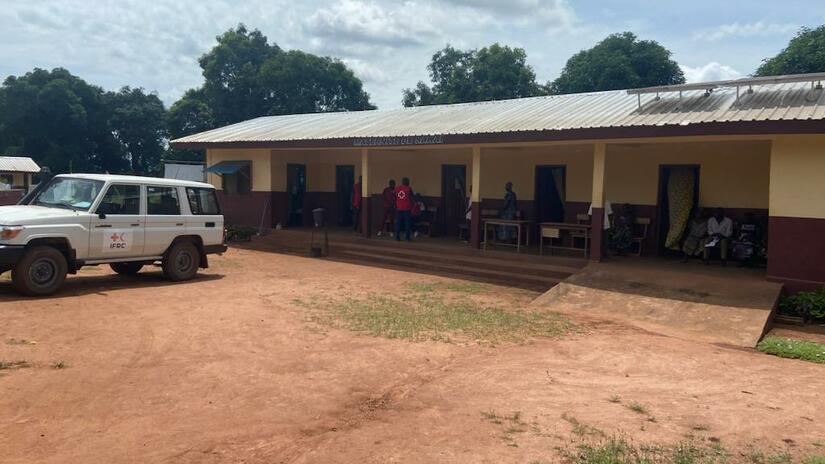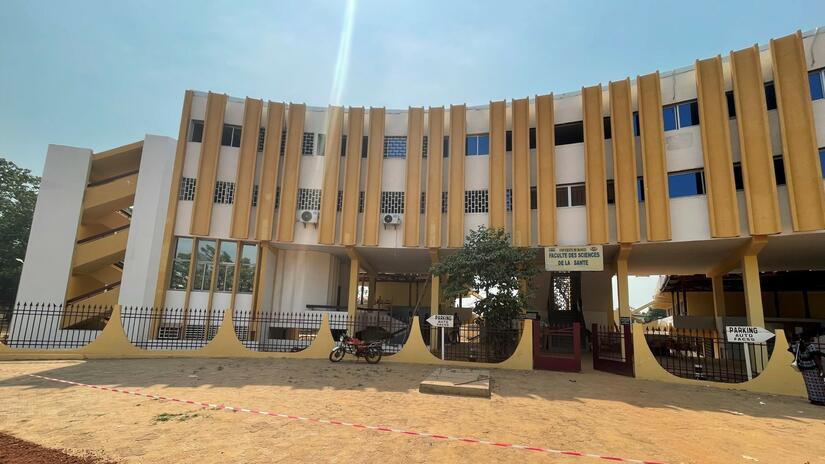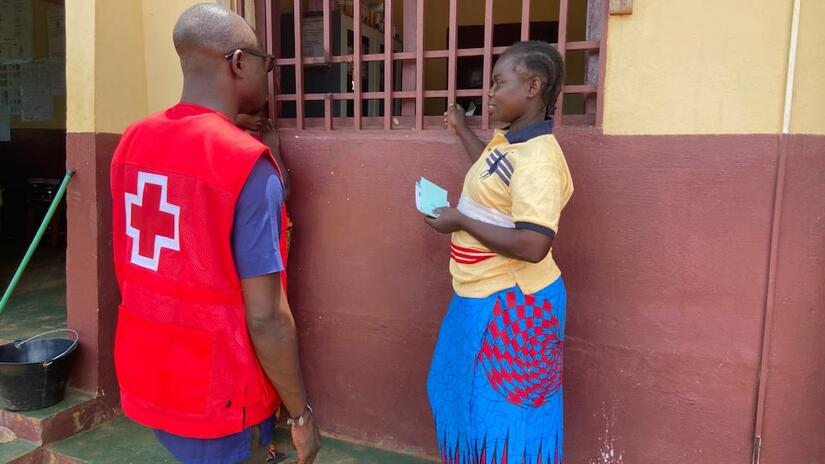IFRC's Muriel Atsama and Bienvenue Doumta, head of communications at the Central African Red Cross, visited several of these facilities and filed this report.
It's 7.30 am when we arrive at the Sakai health centre. On the benches outside, several patients are waiting to be examined by Don de Dieu, who is the head nurse that day.
Among the many patients sitting on the benches is Rebecca, who is holding her sick daughter in her hand. "My family and I used to come here for consultations when we were ill," she says. "The nurses treat us well and we get free medication”.
Located about thirty kilometres from the capital, Bangui, the Sakai centre receives patients from 36 villages. Renovated in 2020 by the Central African Red Cross (CARC), it previously consisted of a single building made of earth and was in a state of advanced deterioration.
Now the centre now has two buildings, including a maternity hospital, a room for maternal, child-health and family-planning, a child consultation room, and a child hospitalisation room. There is also a dispensary with a five-bed hospital ward, a treatment room, a laboratory, and a pharmacy.
In previous years, the centre had only the bare minimum to accommodate and treat patients. The renovation and equipping of the centre by the Red Cross has been a breath of fresh air for the whole village. The aim of these renovations was to make the Minimum Package of Activities, a basic standard for heath services, available to the people here.
"The health centre has changed a lot and has really improved," adds Rebecca. "We can see it in the equipment the nurses use to look after us. Today, more than ever, we come here for consultations, and we're satisfied."
For Don de Dieu, these improvements also make it possible to offer hospital services to a greater number of people, consistently and over a longer period.
"Thanks to the project, we have benefited from solar panels that provide continuous electricity," he explains. "We can now carry out patient examinations at any time and store our products in better conditions". The centre has also received an incinerator for waste management, as well as beds, office space, a waste-sorting shed and a borehole for pumping water from the ground.
"Thanks to this new facility, the number of patients attending the Sakai health centre has increased exponentially", adds Don de Dieu. "From around a hundred patients a month in the past, we now welcome more than 500 patients from the surrounding villages.”

A view of the Sakai health centre, recently renovated by the Central African Red Cross Society
Photo: Muriel Atsama/IFRC
Pride of the village
A little further on, we meet Charles, the chief of the village of Sakaï. He explains that this new building is the pride of his village and the surrounding villages. What's more, his entire community gets safe drinking water from the borehole.
"The borehole at the Sakaï health centre is a source of water that serves the whole community," says Charles.
The Sakai health centre is not the only one to have benefited from these rehabilitations. A total of 14 other health centres across the country and one hospital have received a wide range of equipment, including an ambulance, an X-ray machine and other equipment required to meet the necessary standards.
Our visit continued at Bangui University's Faculty of Health Sciences, where we were welcomed by the Dean, Professor Boniface Koffi. "Thanks to the Red Cross and its donors, all the offices have been renovated,” he said. “The roofs of some buildings have been replaced, as has the electricity. We have also received office furniture, around 1,200 chairs and tables for the comfort of our students, as well as around twenty microscopes.”
The University of Bangui was founded in 1969, and the two buildings that make up the Faculty of Science and Health were constructed in 1970 and 1980. Since then, they had not been renovated, and crises weakened them.

The outside of the refurbished Bangui University Faculty of Health Sciences building.
Photo: Muriel Atsama/IFRC
A perfect illustration
In addition to this equipment, the Red Cross has equipped the faculty's digital library with 35 desktop computers, eight laptops and video projectors.
"We are very grateful for this major donation from the Central African Red Cross, which has breathed new life into our faculty,” he concludes. “But as you know, the hand that receives asks for more. We would like to have many more classrooms to accommodate and train even more students. Our country badly needs them for the well-being of the population".
Our journey ends at the Central African Red Cross University Institute for Paramedical Training, where we are welcomed by Honorine Konzelo, Director of the Institute studies. Created in 2010, the initial building was constructed at the CARC headquarters.
Following the crisis that hit the country, the institute was relocated to an abandoned primary school that was in urgent need of renovation. Today, it has three laboratory rooms, a library and lecture theatres. The Red Cross is also paying the salary of the staff accountant, who has also worked as a teacher since the project began.
"Our institute is a perfect illustration of the Red Cross's commitment to the well-being of young people, who need high-quality training, and to the population, which needs qualified health workers," says Ms Honorine.
The CAR health system reconstruction project has been implemented by the Central African Red Cross since 2018 thanks to technical support from IFRC. Funded by the Kreditanstalt für Wiederaufbau (KFW), the project is in its second phase of implementation, which will run until 2026.

